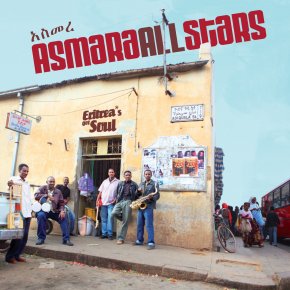Little music has been heard from Eritrea, a small country on the north east coast of Africa, by Western ears in recent years. Eritreans have had other things to deal with than releasing their music out into the wilder world, like years of war with neighbouring Ethiopia and a struggle for independence.
While Eritrean music may have been hard to come by, many of the musicians themselves have appeared on releases from across the border. Recordings from the Ethio-jazz movement of the late 1960s and early 1970s – which birthed the likes of Mulatu Astatke – featured many Eritrean musicians. That "golden age" big band sound was given a reappraisal thanks to the Ethiopiques compilation reissue series, and in particular, on the series’ fifth volume which is devoted to music from Tigray and Eritrea. The tracks on Eritrea’s Got Soul may not have the dusty nostalgic feel that the 40-year-old Ethiopian recordings muster, but they do capture a timeless spirit of that time. Smoky big band jazz number ‘Ykre Belni’ sounds as fresh today it would had it been created in 1971 – it is a style that has not dated in Eritrea.
The Eritrean people have been through tough times, but it’s hard to tell listening to this celebratory album. Eritrea’s Got Soul fuses much of the country’s diverse music, from mournful ballads to uplifting dancehall numbers and includes reinterpretations of both folk and pop classics and attempts to update some of the more traditional styles.
French producer Bruno Blum was responsible for bringing together some of Eritrea’s best musicians to form the All Stars band, with different singers from different backgrounds performing on each track. Eight of the country’s nine languages are represented on its 13 songs, with musicians coming from the capital Asmara – sitting higher than Mexico City at 2,325m above sea level, to one guest, whose home in the Rift Valley in the "horn" of Africa, is below sea level – and is the hottest place in the world. And a selection of African instruments, including the lyre-like krar, darbooka drums, congos, and oud, meet with a formal big band set-up of guitars, bass, drums, organ and brass.
Blum attempted to give arrangements a modern twist, like introducing bass to gwaila track ‘Eritrean Girl’ that would traditionally feature just hypnotic krar and thumping drums, but with results that satisfied the initially hesitant musicians. Elsewhere, ‘Anisaku’, the traditional love song sung in the native language Afar of Danakil warrior Mohammed Ahmed Shaabi, retained its original structure.
‘Wushate’ is a pop classic in the country. Its original release in 1986 rallied people who had lived "a life of struggle, a life you would not like to live" and was written by Brkti Weldeslassie as a response to her having to leave home to fight in the war. "I reminisce today about the past, The hardship I went through… I will grace my country Eritrea," she sings. Still available on poor quality cassettes, it was decided a well-recorded reworking was necessary for this project. Weldeslassie’s delicately urgent voice floats above a slow tempo, and clean backing, with a lick not unlike the wooze of Fleetwood Mac’s ‘Albatross’.
Album opener ‘Amajo’ is sung by the country’s best known pop diva Faytinga, and is a reworking of a track from her 1999 album Numey – notable as the first CD recorded in the country. Her shrill voice beautifully lolls over a Kunama rhythms and dramatic ska inflected backing, with clean guitar lines coolly following Faytinga’s phrasing.
Aside from Jamaican roots reggae, not many outside influences have made it to Eritrea, leaving the musicians musically suspended in the soulful traditions of the 1970s big band sound, which gives the record its timeless appeal. The Eritrean people who endured decades of war before the small country secured its’ independence in 1991, were effectively detached. So Eritrea’s Got Soul stands as a chance to redress that balance. The record showcases the wealth of Eritrea’s talented musicians, singers and songwriters, all of whom bring something different to the mix. A celebration of the nation’s rich cultural and musical heritage, Eritrea finally has a voice of its own, and it swings.


